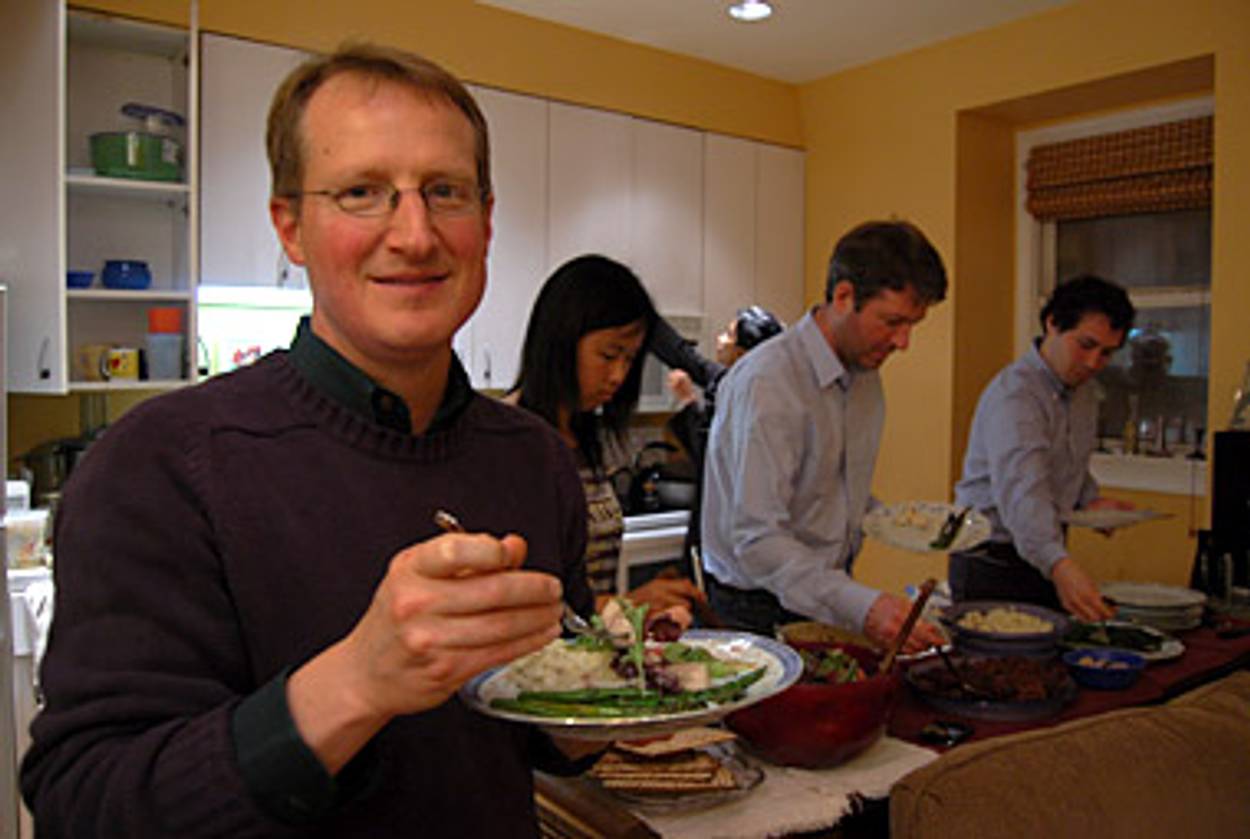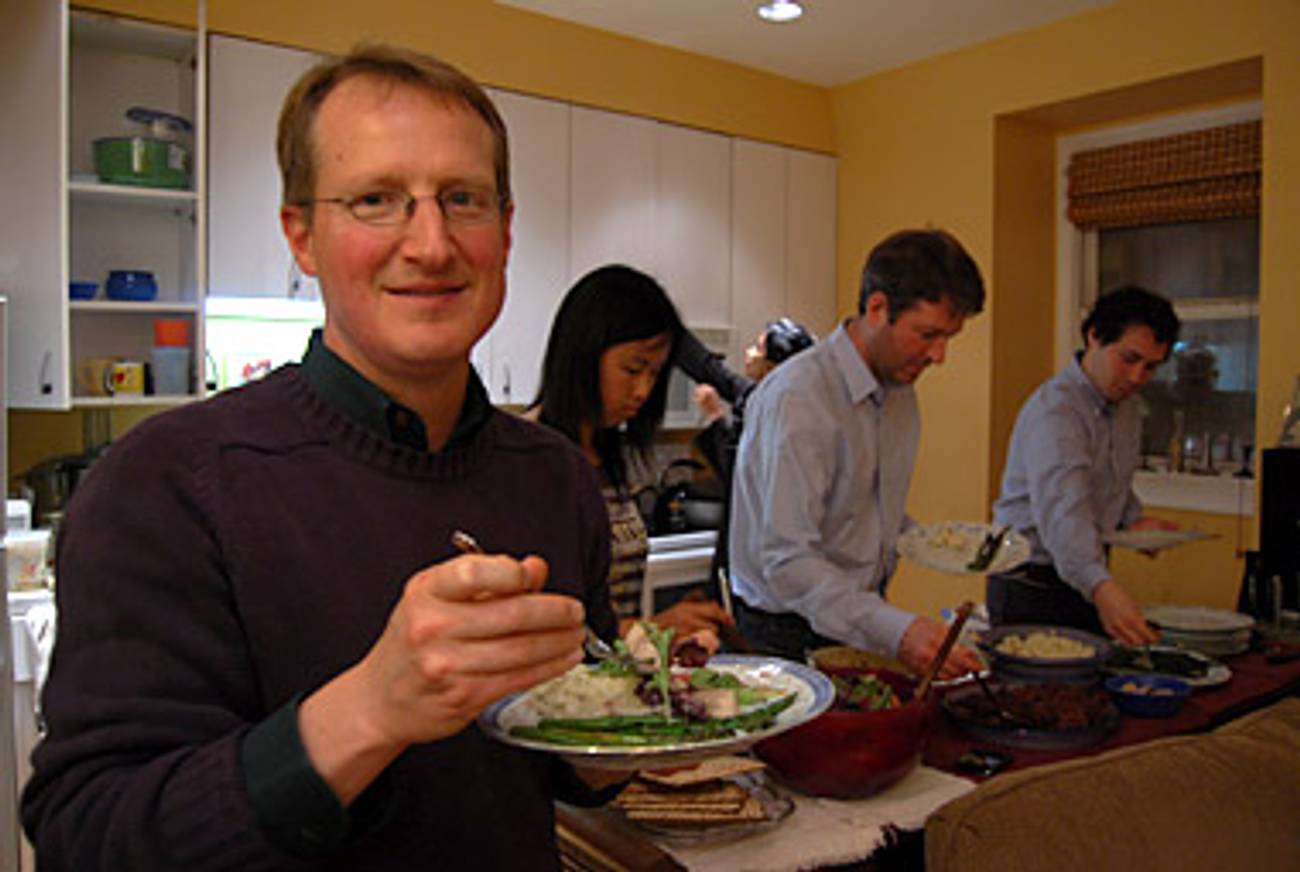A Different Night
A Washington journalist discusses some of the Christian seders he has thrown




Like Levy’s, it seems, you don’t have to be Jewish to love Passover. In fact, some Christians also conduct Seders, sometimes as part of the ritual observances leading up to Easter (despite the disputes about whether the Last Supper really was a Passover meal).
Others just like the excuse for a big communal meal. Chris Billing, a 48-year-old journalist and documentary filmmaker, hosts a weekly Bible study group at his Washington, D.C., condo, and held a Seder on Monday night with 10 friends, only one of whom was Jewish. He talked to Tablet Magazine about why.
Why did you decide to start holding a Seder?
This is the second year we’ve had a Seder among this group in D.C. The impetus for the first one wasn’t anything spiritual or ecumenical at all—a friend of mine came across a recipe for matzoh ball soup on Epicurious.com, and she was looking for an occasion to make it. She’s Chinese and hadn’t made it before so we figured a Seder would be a good time to make it.
When was your first Seder?
My first exposure to the Seder was in Israel. As far as I know there was really only one Jewish family in the town where I grew up, in upstate New York, so I didn’t really know anything about Jewish holidays when I was younger. As long as I can remember, we would be at our family’s Baptist church every Sunday, and I majored in religious studies in college at a small school that was then called the Philadelphia College of Bible (now Philadelphia Biblical University), with a thought of going into the ministry. As an undergraduate I spent two years living in Israel studying Hebrew, along with archaeology and Middle Eastern history at the Institute of Holy Land Studies, and I took Hebrew classes at Hebrew University. My parents had gone to Israel through Christian organizations they were involved with, and they always wanted me to go—they were just amazed by the place—so I went for my junior year abroad, and got infatuated with living there. I was in Jerusalem, and had a nice community with Jewish friends who would invite me for Passover. I was certainly the only Christian there.
Did you keep up the tradition after you left Israel?
I wound up going to Harvard Divinity School, majoring in world religion, but between college and divinity school, I got a call completely out of the blue from someone affiliated with Beijing University asking if I was interested in teaching Hebrew in China. This was in 1986. At that time China and Israel did not have diplomatic relations, and China had strong relations with the Palestine Liberation Organization and the Arab countries, though they were moving toward establishing relations with Israel. They wanted to have some students who were familiar with the language, but they didn’t want to hire anyone who was Israeli and didn’t even really want anyone who was Jewish because they didn’t want any political or religious overtones to the course.
Because I was the Hebrew teacher I became a focal point for the Jewish community among foreign students studying in Beijing, even though I’m not Jewish. It was mostly American Jews. And about 10 of us got together and had a Seder. There was one supermarket affiliated with a hotelthat had matzoh, but I think people had relatives in the States send it over. We got a live chicken and had one of the other students slaughter it, and we included a few of my students from the Hebrew class. They were Chinese and not Jewish, and it was definitely their first Seder.
How was it organizing the Seder yourself, with so many people who weren’t familiar with the traditions?
I think a lot of Christians think of this idea of the Judeo-Christian ethic, and the Judeo-Christian society, but they don’t know much about the Judeo part. Having a Seder really brings that home. Once we came up with the idea based on the matzoh ball soup, my thought was that if we were going to do it, we’d better do it right. So we took it very seriously. A friend of mine who isn’t Jewish was commissioned with the task of getting the shank bone, and she went to a butcher in her neighborhood and said, “You’ll think I’m crazy but do you have a shank bone?” Of course he said, “You need it for a Seder?” And she was shocked that he had them wrapped and ready.
I got a haggadah from the JCC, one with a picture of matzoh on the cover. We went all the way through it. Or most of it. The truth is we do an abridged version—the parts about the rabbis getting into the minutiae, we skip that. But we open the door for Elijah, and we flick the wine drops for the plagues, and we hide the afikoman. And we sing. Seders are like the Jewish Top 40 in terms of songs, but they’re all tongue-twisters, which is hard because by the time you get to them, you’ve had several glasses of wine. Last year a friend of mine, Liz, came, and she’s half-Jewish, so she’d been raised with Seders at home, which was helpful because, well—everyone loves singing Dayenu but I’m the only one who can sing the verse.
At certain points we threw it open for questions—there were a fair number of journalists there, and they’re not shy about asking questions. Some people weren’t familiar with the whole story, so we went through that, and talked about the plagues, and the things the items of the Seder plate represent. We used the haggadah and Wikipedia as our sources—I had printed it out, just to make sure I had the Seder plate arranged properly. This year we had an exchange student from China, who read the Four Questions, and she had a lot of questions about what it all meant.
How did your guests feel about the experience?
One of the people there this year was Jewish, and he brought his girlfriend, who isn’t Jewish, and he called me and said she told him that in addition to it being educational and a good ecumenical experience, it really makes you feel connected with humanity, and makes you realize who God is, and how he works in the nation of Israel. And I think all of us felt that it’s sort of uplifting and encouraging to be the keeper of a tradition like that.
Allison Hoffman is a senior editor at Tablet Magazine. Her Twitter feed is @allisont_dc.
Allison Hoffman is a senior editor at Tablet Magazine. Her Twitter feed is @allisont_dc.